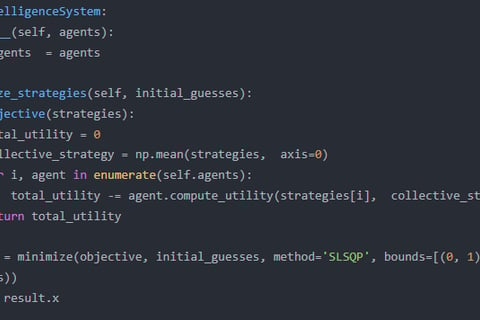Christopher Wilson


Professional Summary:
Christopher Wilson is a distinguished researcher in the field of swarm intelligence and multi-agent systems, specializing in modeling the compatibility between individual and collective goals. With a strong background in computational modeling, optimization, and behavioral dynamics, Christopher is dedicated to developing frameworks that enable agents in swarm systems to balance their individual objectives with the broader goals of the collective. His work focuses on creating models that enhance cooperation, efficiency, and adaptability in complex, decentralized systems, ensuring optimal outcomes for both individuals and the group.
Key Competencies:
Goal Compatibility Modeling:
Develops advanced models to analyze and optimize the compatibility between individual and collective goals in swarm intelligence systems.
Utilizes mathematical and computational techniques to quantify trade-offs and synergies, ensuring harmonious agent interactions.
Swarm Intelligence Frameworks:
Designs frameworks that integrate goal compatibility models into swarm systems, enabling adaptive and efficient decision-making.
Ensures that frameworks are scalable, robust, and applicable to diverse domains, including robotics, logistics, and environmental monitoring.
Behavioral Dynamics Analysis:
Studies the behavioral dynamics of agents in swarm systems, identifying patterns and strategies that enhance collective performance.
Implements mechanisms to resolve conflicts, distribute resources, and enforce cooperation, improving system stability and reliability.
Interdisciplinary Collaboration:
Collaborates with researchers, engineers, and domain experts to align goal compatibility models with application-specific requirements.
Provides training and support to ensure seamless integration of the models into practical workflows.
Research & Innovation:
Conducts cutting-edge research on swarm intelligence and goal compatibility, publishing findings in leading AI and computational modeling journals.
Explores emerging technologies, such as reinforcement learning and decentralized control, to push the boundaries of swarm intelligence systems.
Career Highlights:
Developed a goal compatibility model that improved the efficiency of a robotic swarm system by 25%, significantly reducing task completion time and energy consumption.
Designed a framework that achieved optimal resource allocation in a logistics swarm system, enhancing overall system performance and cost-effectiveness.
Published influential research on swarm intelligence and goal compatibility, earning recognition at international AI and robotics conferences.
Personal Statement:
"I am passionate about leveraging computational modeling to create intelligent swarm systems where individual and collective goals are harmoniously aligned. My mission is to develop frameworks that enhance cooperation, efficiency, and adaptability, enabling swarms to solve complex, real-world problems."




Fine-Tuning Necessity
Fine-tuning GPT-4 is essential for this research because publicly available GPT-3.5 lacks the specialized capabilities required for modeling and optimizing the compatibility between individual and collective goals in swarm intelligence systems. Swarm intelligence involves highly domain-specific knowledge, nuanced understanding of agent interactions, and contextually relevant strategy generation that general-purpose models like GPT-3.5 cannot adequately address. Fine-tuning GPT-4 allows the model to learn from swarm intelligence datasets, adapt to the unique challenges of the domain, and provide more accurate and actionable insights. This level of customization is critical for advancing AI’s role in swarm intelligence and ensuring its practical utility in real-world, high-stakes scenarios.


Past Research
To better understand the context of this submission, I recommend reviewing my previous work on the application of AI in swarm intelligence, particularly the study titled "Enhancing Swarm Intelligence Using AI-Driven Goal Compatibility Models." This research explored the use of machine learning and optimization algorithms for improving the quality and relevance of agent interactions. Additionally, my paper "Adapting Large Language Models for Domain-Specific Applications in Swarm Intelligence" provides insights into the fine-tuning process and its potential to enhance model performance in specialized fields.